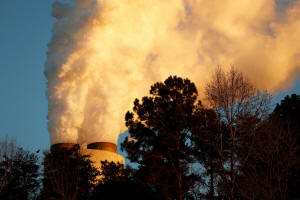Supreme Court ruling casts cloud over U.S. leadership in global climate
fight
 Send a link to a friend
Send a link to a friend
 [July 01, 2022]
By Michelle Nichols and Kate Abnett [July 01, 2022]
By Michelle Nichols and Kate Abnett
UNITED NATIONS (Reuters) -A Supreme Court
ruling on Thursday limiting Washington's authority to reduce carbon
output from power plants will hurt global efforts to fight climate
change by slowing America's emissions cuts and undermining U.S.
leadership efforts on the international stage, according to diplomats.
The conservative court's 6-3 ruling, the latest in a flurry of
controversial judicial decisions from the bench, comes as the
administration of U.S. President Joe Biden seeks to decarbonize the U.S.
economy and rally global ambition to move away from greenhouse
gas-emitting fossil fuels to cleaner sources.
"It is very disappointing as it makes it very difficult for the U.S.
administration to enforce the move to reduce emissions of GHGs," said
Carlos Fuller, Belize's Ambassador to the United Nations. "It also puts
the administration in a very weak negotiating position, as their
attempts to get everyone to increase their ambition will be met with
scepticism."
In a rare criticism of a member state, the United Nations on Thursday
called the Supreme Court ruling "a setback in our fight against climate
change."

"Decisions like the one today in the U.S. or any other major emitting
economy make it harder to meet the goals of the Paris Agreement for a
healthy, liveable planet," United Nations spokesman Stephane Dujarric
said, referring to a 2015 international deal to curb warming.
"But we also need to remember that an emergency as global in nature as
climate change requires a global response, and the actions of a single
nation should not and cannot make or break whether we reach our climate
objectives."
[to top of second column]
|

Steam rises from Duke Energy's Marshall Power Plant in Sherrills
Ford, North Carolina, U.S. November 29, 2018. REUTERS/Chris Keane

Scientists have said the world must dramatically
reduce its emissions in the coming years in order to limit global
warming to 1.5 or 2 degrees Celsius above pre-industrial levels, the
threshold at which they say the worst effects of climate change
become unavoidable.
Biden acknowledged in a statement that the ruling risked damaging
the U.S. ability to combat climate change. But he added: "I will not
relent in using my lawful authorities to protect public health and
tackle the climate crisis."
"I have directed my legal team to work with the Department of
Justice and affected agencies to review this decision carefully and
find ways that we can, under federal law, continue protecting
Americans from harmful pollution, including pollution that causes
climate change," Biden said.
Yamide Dagnet, director of climate justice at Open Society
Foundations, and a former climate negotiator for the UK and EU, said
the world will be watching.
"To renew confidence in its leadership, the U.S. will need to
swiftly pivot and keep its targets on track," she said.
(Reporting by Michelle Nichols at the United Nations and Kanishka
Singh in Washington; Editing by Daniel Wallis)
[© 2022 Thomson Reuters. All rights
reserved.]
This material may not be published,
broadcast, rewritten or redistributed.
Thompson Reuters is solely responsible for this content.
 |